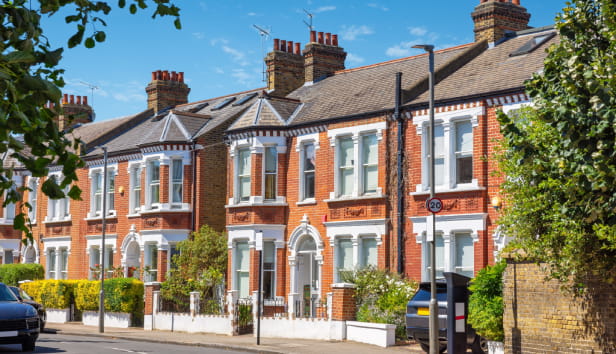

Find out how you could reduce your monthly payments with an interest-only mortgage. Our guide includes information on the benefits and eligibility criteria of this mortgage type, as well as tips for switching to an interest-only mortgage with Saga.
When you take out an interest-only mortgage, you only pay the interest each month on the amount you’ve borrowed. This results in lower monthly payments compared to a repayment mortgage, where you repay the loan and interest each month.
At the end of the interest-only mortgage term, you need to repay the full loan amount. If you don’t have enough money, you might need to sell the property to pay off your loan. As with any mortgage, the loan is secured against your home. And if you can’t maintain your monthly payments, your home may be repossessed.
An interest-only mortgage makes your monthly costs more affordable in the short term. It might suit you if you’re low on funds now and expect to be better off in the future. For example, you might inherit money from a loved one.
Before a mortgage provider approves your interest-only mortgage, they may ask for proof that you can pay off the loan at the end of the term. This is known as a ‘repayment vehicle’ and could be proof of an investment, an ISA or a life insurance policy.
Another option at the end of your interest-only mortgage term is to switch to a repayment mortgage. This will usually increase your monthly payments, but it allows you to pay off your mortgage in full.
Lenders each have their own criteria when it comes to interest-only mortgages, but there are some common requirements you’re likely to come across:
Whether you have questions about a specific kind of mortgage or just want to find out more, the expert team are on hand to help.
Mon-Thu 9am-8pm
Fri 9am-5:30pm
Sat-Sun 10am-3pm
Interest-only mortgages don’t suit everyone, so it’s important to weigh up the pros and cons first.
Some of the benefits of interest-only mortgages include:
Some of the disadvantages of interest-only mortgages include:
Some buy-to-let landlords opt for interest-only mortgages. This is because they can earn a regular income from rent, then sell the property at the end of the mortgage term to pay off the capital.
When you take out a repayment mortgage, you pay back some of the loan and some interest each month. As long as you keep up with payments, you will pay off the entire loan by the end of the term.
The difference with an interest-only mortgage is that you only pay the interest on the loan each month. By the end of the term, the amount you borrowed won’t have decreased, so you’ll still need to pay it back.
When your interest-only mortgage comes to an end, you’ll need to repay the original loan amount (the capital), as your monthly payments will have only covered the interest.
Ideally, you’ll have a repayment plan in place – such as savings, investments, or other assets – to cover the amount you owe.
If you’re unsure whether your plan is on track, it’s worth reviewing your options sooner rather than later. Our comprehensive guide to paying off an interest-only mortgage that’s ending has more information.
Unfortunately, not everyone will be able to pay off their interest-only mortgage when their term comes to an end. Fortunately, there are a few options available if you find yourself in this position.
You could use a repayment plan you’ve set up over the years, extend the mortgage term or consider downsizing to a smaller property to release funds.
Another option is remortgaging with another lender, where you could switch to a repayment mortgage and begin paying off the capital as part of your monthly repayments.
We partner with Tembo Money to give you access to award-winning mortgage advice. Tembo’s expert advisors can chat through your options and help find an interest-only mortgage that works for you.
Get in touch today and discover how you could reduce your monthly payments with an interest-only mortgage.
All mortgage advice provided by Saga Mortgages is supplied by Tembo Money Limited, which is regulated by the Financial Conduct Authority (FCA) under registration number 952652.
Their team of award-winning mortgage advisors can help you with a range of mortgage solutions, including:
Yes, you can. Making overpayments on an interest-only mortgage allows you to reduce the original loan amount (the capital) quicker. This can reduce the final lump sum you’ll need to repay at the end of the term, or help you clear the mortgage sooner.
It’s worth noting that your regular monthly payments, which usually cover just the interest, will typically stay the same unless you choose to renegotiate your mortgage terms.
If you’re trying to sell your home to pay off your interest-only mortgage but encounter problems that prevent you from doing so, contact your lender to discuss your options.
You’re only eligible for an interest-only mortgage if you meet the criteria set out by a lender. Typically, interest-only mortgages are aimed at buy-to-let or residential purchases
Your home may be repossessed if you fail to repay your mortgage. Saga Money may receive payment from Tembo if you get a mortgage offer via the Saga Mortgages service. This will not affect the amount you pay for the service.
Saga is a registered trading name of Saga Personal Finance Limited, which is registered in England and Wales (company number 3023493). Registered office 3 Pancras Square, London, N1C 4AG. Saga Personal Finance Limited is authorised and regulated by the Financial Conduct Authority under the registration number 178922.
Tembo Money Limited (12631312) is a company registered in England and Wales with its registered office at 18 Crucifix Lane, London, SE1 3JW. Tembo is authorised and regulated by the Financial Conduct Authority under the registration number 952652. Tembo Money was awarded Best Mortgage Broker at the British bank awards in 2022, 2023, 2024 and 2025.


Provided by Tembo
Find out all you want to know about mortgages with expert advice.


Saga help explain how you can pay off an interest-only mortgage.

Discover all the essential information about mortgages in principle in our detailed guide.